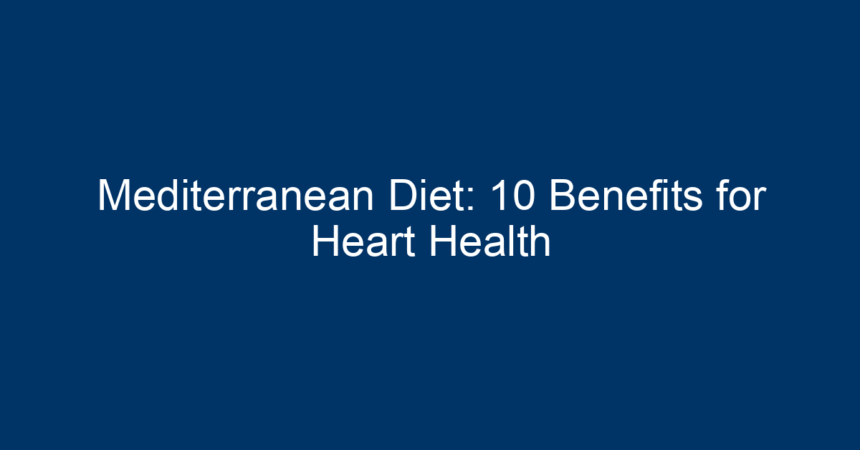In recent years, the Mediterranean diet has surged in popularity—not just for its delicious flavors but also for its impressive health benefits. This dietary pattern, inspired by the traditional eating habits of countries bordering the Mediterranean Sea, is rich in fruits, vegetables, whole grains, fish, nuts, and healthy fats. One of its standout claims is its profound impact on heart health. In this article, we’ll explore ten compelling benefits of the Mediterranean diet for cardiovascular wellness, while also providing actionable insights to help you incorporate these healthful eating habits into your everyday life.
What Is the Mediterranean Diet?
The Mediterranean diet isn’t just a diet; it’s a lifestyle. It emphasizes:
- Whole Foods: Fresh fruits and vegetables, legumes, nuts, and whole grains.
- Healthy Fats: Emphasizing olive oil as the primary source of fat, accompanied by omega-3 fatty acids found in fish.
- Moderate Dairy and Wine: Enjoying moderate amounts of yogurt and cheese while allowing for moderate red wine consumption.
- Limited Processed Foods: Reducing the intake of refined sugars and red meats.
The methodology of this diet promotes not only physical health but also mental well-being, making it a holistic approach to health.
1. Reduced Risk of Heart Disease
Numerous studies have indicated that adhering to the Mediterranean diet significantly lowers the risk of heart disease. The regular consumption of olive oil and nuts, which are high in monounsaturated fats and antioxidants, contributes to this protective effect. Furthermore, whole grains and fibers help to maintain healthy cholesterol levels, reducing cardiovascular risk.
2. Lower Blood Pressure
High blood pressure is a significant risk factor for heart disease. The Mediterranean diet is rich in potassium, magnesium, and fiber, which can help lower blood pressure levels. Foods such as fruits, vegetables, and legumes are naturally low in sodium and high in essential nutrients, making them heart-healthy choices.
3. Improvement in Blood Lipid Profiles
One of the key benefits of the Mediterranean diet is its ability to improve blood lipid profiles. Regular consumption of healthy fats, particularly from nuts and olive oil, can lead to increased levels of HDL (the "good" cholesterol) and lower levels of LDL (the "bad" cholesterol). This improvement is vital in reducing the risk of atherosclerosis, which can lead to heart attacks and strokes.
4. Decreased Inflammation
Chronic inflammation is closely tied to numerous health issues, including heart disease. The Mediterranean diet is rich in antioxidants and anti-inflammatory compounds found in fruits, vegetables, and herbs. Regularly eating foods like tomatoes, berries, and walnuts can help combat inflammation, leading to better cardiovascular health.
5. Better Weight Management
Obesity is a known risk factor for heart disease. The Mediterranean diet promotes healthy weight management through its focus on nutrient-dense foods that are lower in calories. By replacing processed foods with wholesome, filling options, individuals are more likely to maintain a healthy weight, reducing heart disease risk.
6. Improved Diabetes Management
There is a strong link between diabetes and heart disease. The Mediterranean diet helps in managing blood sugar levels due to its emphasis on whole grains, legumes, fruits, and vegetables—all of which have a low glycemic index. This balance helps prevent spikes in blood sugar, aiding in diabetes management and thereby protecting heart health.
7. Enhanced Gut Health
A healthy gut contributes to overall health, including heart health. The Mediterranean diet includes plenty of fiber from plant-based foods, which promotes healthy digestion and gut microbiota. A thriving gut can help reduce inflammation and improve metabolic health, both of which are crucial in maintaining a healthy heart.
8. Increased Physical Activity
While food plays a significant role in the Mediterranean lifestyle, physical activity is equally essential. People in Mediterranean regions often engage in regular physical activity, which directly complements the dietary benefits. Exercise improves cardiovascular health, enhances mood, and aids in weight management, creating a synergistic effect with the Mediterranean diet.
9. Cognitive Benefits
Heart health and brain health are interconnected. Emerging research suggests that a diet rich in healthy fats and phytonutrients, like those found in the Mediterranean diet, may protect against cognitive decline and conditions like Alzheimer’s disease. This is because good heart health enhances blood flow to the brain, maintaining cognitive function.
10. Social and Mental Well-being
The Mediterranean lifestyle embraces communal eating and social gatherings centered around meals. This social aspect fosters a positive relationship with food, reducing stress and promoting mental well-being. A strong psychological state is essential for maintaining heart health, making the Mediterranean diet not just a physical but also a mental booster.
Actionable Insights: Incorporating the Mediterranean Diet into Your Life
Transitioning to the Mediterranean diet can be a delightful culinary adventure. Here are some actionable tips to help you get started:
Start with Small Changes
If you’re new to the Mediterranean diet, begin by gradually incorporating its principles into your meals. For example, swap butter for olive oil, replace red meat with fish, and increase your vegetable intake.
Explore New Recipes
Utilize the resources available online or cookbooks dedicated to Mediterranean cuisine. Experimenting with different recipes can make healthy eating more enjoyable.
Make Fruits and Vegetables Your Staples
Aim to fill half your plate with fruits and vegetables at each meal. This can boost fiber intake and provides essential vitamins and minerals beneficial for heart health.
Choose Whole Grains
Replace refined grains like white bread and pasta with whole grains such as whole wheat bread, brown rice, quinoa, and barley. This switch supports heart health and maintains steady energy levels.
Enjoy Meal Time
Make a habit of savoring your meals without distractions. Embrace the Mediterranean culture by enjoying meals with family or friends, focusing on conversation and connection.
Stay Active
Incorporate physical activity into your daily routine. Whether it’s walking, cycling, or yoga, find something you love and make it a part of your day.
Conclusion
The Mediterranean diet is more than just a meal plan; it’s a lifestyle that offers numerous benefits for heart health. With a focus on nutritious whole foods, healthy fats, and a balanced approach to eating, it’s a powerful tool for preventing heart disease and fostering overall well-being. By incorporating the Mediterranean diet into your life, you can take charge of your heart health while enjoying delicious and satisfying meals. Start today, and experience the radiant benefits of this vibrant dietary pattern!




